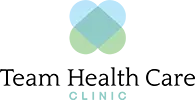rTMS or Repetitive Transcranial Magnetic Stimulation is a drug free, noninvasive treatment best known for depression and is currently offered at Team Health Care Clinic in Champlin, MN. rTMS is an FDA cleared device for treatment of depression but has also been shown to be beneficial for ADHD, anxiety, insomnia, and other brain-based disorders. Since the earliest studies were focused on people with depression, virtually all insurance plans, including Medicare, cover rTMS for resistant depression.
$69 New Patient Special
Includes Full consultation, In-depth exam, Chiropractic adjustment, Action plan, Targeted muscle therapy (ex. electrical muscle stimulation).
How Our Care Plan Works
1. Body
Misalignment = Miscommunication = Misery. Pain, tightness, poor posture, inflammation—it’s all your body screaming for help. When the spine is off, your nervous system can’t work right. We realign the body through chiropractic, physical therapy, and acupuncture to get you moving, healing, and living again.
2. Brain
Your brain controls every cell, organ, and system in your body. If the brain-to-body connection is blocked—even slightly—you feel it: pain, fatigue, brain fog, anxiety. Most doctors miss this. We don’t. We restore the brain’s ability to run the show—so your body can finally heal. Because when your brain fires right, your whole body functions better. And when that connection is restored, everything changes.
3. Chemistry
Your Gut Talks to Your Brain—Loudly . 80% of your brain’s neurotransmitters come from your gut. If your digestion, blood sugar, or hormones are off, your brain will suffer. We use advanced functional medicine to fix the chemistry behind your symptoms—because supplements and meds aren’t enough when the root is still there.
What is rTMS?
rTMS is a medical grade magnet that is used to balance the speed of the frequency of firing of the nerves in the brain. The magnet sends a signal that can be varied to stimulate or slow down the nerves in specific regions of the brain, depending on the patient’s disorder.
For example, people with depression, concussions and ADHD are found to have a slowing of the frequency of firing of the brain. People with anxiety and insomnia are often found to have a faster than normal firing of the brain. In our clinic, we use a 19-lead electroencephalogram, or EEG to determine the frequency of firing in the brain.
An EEG measures the electrical firing of the brain much like an EKG measures the heart. Huge data bases have been developed that have allowed us to make comparative studies of our patient’s EEG versus a normative data base. We can now objectively determine if a patient’s symptoms are related to abnormal firing of the brain and require a modality such as rTMS to speed up or slow down the firing. No guesswork!
A cautionary warning to all readers considering rTMS: Not all rTMS providers select their patients based on this objective high-tech EEG testing. Many are still determining their patient’s candidacy by their symptoms alone. We find our patients are impressed and feel validated when the objective testing determines that their brain is simply not firing as it should.
rTMS is NOT electroconvulsive therapy.
rTMS should not be confused with electroconvulsive therapy or even medication management where side effects are potentially severe such as cognitive impairment, sexual dysfunction, weight gain and many others. Our patients resume normal activity following a treatment session as the worst side effect may be a mild headache. Even this is rare.
As one patient put it, “what do I have to lose?” when she considered her treatment options for anxiety. rTMS is a low risk, highly success option for qualified candidates. Here is what one rTMS patient had to say about his results:
If you are interested in learning more about rTMS, call our clinic at 763-323-1492 to schedule an “rTMS consultation and examination” with one of our medical providers.
Joe Bertsch, DC
$69 New Patient Special
Includes Full consultation, In-depth exam, Chiropractic adjustment, Action plan, Targeted muscle therapy (ex. electrical muscle stimulation).


